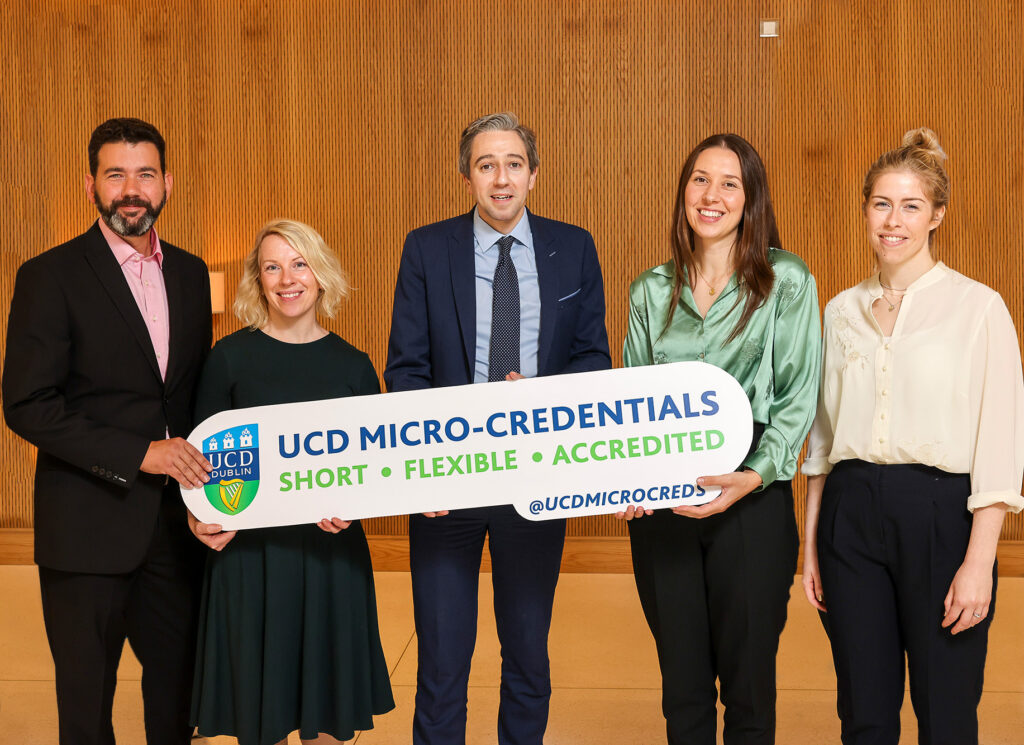Collaboration for Change: Introducing Micro-credentials at UCD
By Sorcha Mulcahy, UCD MicroCreds Senior Project Manager

From left to right: Prof. Jason Last (UCD Dean of Students), Sorcha Mulcahy (UCD Micro-credentials Project Manager), Minister Simon Harris, Sophie Bonheim (Senior Marketing & Communications), and Dererca Ní Chianáin (Educational Technologist).
In June of this year, the Council of the European Union (EU) adopted a Recommendation on a European approach to micro-credentials for lifelong learning and employability. The Recommendation seeks to support the development, implementation, and recognition of micro-credentials across institutions, businesses, sectors, and borders.
Welcoming this recommendation, Minister for Further and Higher Education, Research, Innovation and Science, Simon Harris, noted that “In Ireland, and across Europe and the world, we are facing unprecedented change... ……Life-long learning and the development of new skills throughout our lives is imperative for everyone. People can no longer depend on the skills that they acquire in school or college, or those skills that they develop in the early phases of their careers – they need to continually add to their skill sets and develop new ones.”
With MicroCreds, a 5 year (2020-2025), €12.3 million project, funded via the Pillar 3 of the Human Capital Initiative (HCI), Ireland will be the first European country to establish a coherent National Framework for quality assured and accredited micro-credentials.
MicroCreds is led by the Irish Universities Association (IUA), with seven partner universities – UCD, TCD, DCU, MU, UG, UL and UCC.
What are Micro-credentials?
Micro-credentials are small, accredited courses designed to meet the demands of individual learners, employers, and industry. Micro-credentials aim to address many of the barriers to life-long learning and enable learners to successfully balance further study with work and other commitments. They are designed with busy professionals in mind, who may want to upskill in their current roles, fast-track their career progression, or pivot to a new area, but not have the time to engage with larger programmes of study.
When a learner completes a micro-credential they acquire university credit (ECTS). All micro-credentials can be taken as individual courses, but many can be “stacked” towards a university award, for example, a Professional Diploma or Masters. This approach enables learners to achieve a university qualification at a pace that suits their life and work commitments and promotes engagement with lifelong learning.
Micro-credentials at UCD
The UCD MicroCreds team is working with colleagues across the institution to implement the MicroCreds National Framework and to develop a suite of high-quality micro-credential courses. The School of Agriculture and Food Science has been an early adopter, and under the academic leadership of Prof. Eileen Gibney, School Director of Executive Education, has launched five micro-credential courses; three in the area of food safety and regulation, and two focusing on diet and nutrition. These are particularly timely given Ireland’s commitment in Food Vision 2030 to become a world leader in Sustainable Food Systems (SFS) over the next decade.
Led by Assoc. Prof. Suzanne Egan, School Director of Knowledge Exchange, the Sutherland School of Law has launched ten micro-credentials, covering highly topical areas such Environmental Law and Climate Change Law, as well as courses in Arbitration and Regulatory Investigations, which are of relevance to professionals across a wide range of sectors.
There is a growing UCD micro-credential offering for health professionals. The School of Medicine, under the leadership of Assoc. Prof. Jonathan McNulty, School Associate Dean for Graduate Taught Studies and VPTL in the College of Health and Agricultural Sciences, has recently launched several small (2.5 ECTS) micro-credentials aimed at Health Professionals seeking to upskill in the areas of radiation protection and skin and hair follicle science. These micro-credentials are delivered in an online asynchronous format, so offer “on demand” learning for individuals working in busy healthcare settings. Learners also have the option to stack these micro-credentials into a professional certificate.
Led by Assoc. Prof. James Matthews, Deputy Head of School, the School of Public Health, Physiotherapy and Sports Science will shortly launch new online micro-credentials for registered health professionals, covering areas such as exercise prescription and clinical nutrition.
Smurfit Executive Development and NexSys / UCD Energy Institute are also collaborating with the MicroCreds project, and several other UCD Schools have expressed an interest in the development of micro-credentials. Micro-credentials feature, or are planned, in the offerings of two other HCI-funded projects of which UCD is a partner – the Advance Centre and the Creative Futures Academy. The IOB, a recognised College of UCD, offers a wide range of micro-credentials aimed at professionals working in the Financial Services sector.
A Collaborative Effort
The development of UCD micro-credentials is made possible by the recruitment of MicroCreds funded Teaching Fellows who work collaboratively with academic subject matter experts to develop new academic content, and where appropriate, adapt current modules to make them fit for purpose as standalone micro-credential courses.
Academic colleagues are supported by the MicroCreds Educational Technologist, Dererca Ní Chianáin, in the development of high-quality online and blended learning content, with a strong focus on accessibility and Universal Design for Learning principles.
In collaboration with School-based marketing teams, UCD University Relations, and UCD Alumni Relations, the MicroCreds Senior Marketing Assistant, Sophie Bonheim, supports Schools in promoting their micro-credentials to target audiences, across a range of channels.
While academic colleagues are developing micro-credential courses, professional and administrative colleagues are helping to drive and implement the process and systems changes required to ensure the smooth integration of micro-credentials into UCD’s academic offering. Providing a positive learner experience is critical to the success of UCD micro-credentials, and this encompasses everything from ease of access to course information, to a user-friendly application process, and a stream-lined approach to the stacking of micro-credentials into awards. The expertise, guidance, and support of colleagues across the Registry function has been of enormous significance in this endeavour, particularly the Curriculum team, Admissions, Fee Payments, Student Records and Assessment/Grading.
Under the direction of the MicroCreds IT Project Manager, Sarah Allen, EAG colleagues are delivering several IT systems enhancements with the aim of improving the applicant/learner experience, reducing the administrative burden for Schools offering micro-credentials, and facilitating the integration of the UCD Curriculum Management System with the MicroCreds National Portal (due for launch in early 2023).
The expertise and support of colleagues in University Secretariat, the Quality Office, ALL, Educational Technology Services, Finance, the Careers Network and Teaching and Learning also continues to be invaluable in shaping the UCD Micro-credential offering and avoiding implementation pitfalls.
While UCD is still in the early stages of its micro-credential journey, and there is a lot of work yet to be done, the positive response of the UCD community, and the willingness to support this new initiative has been a key enabler of progress to date. For more information on UCD micro-credentials please go to www.ucd.ie/microcredentials



